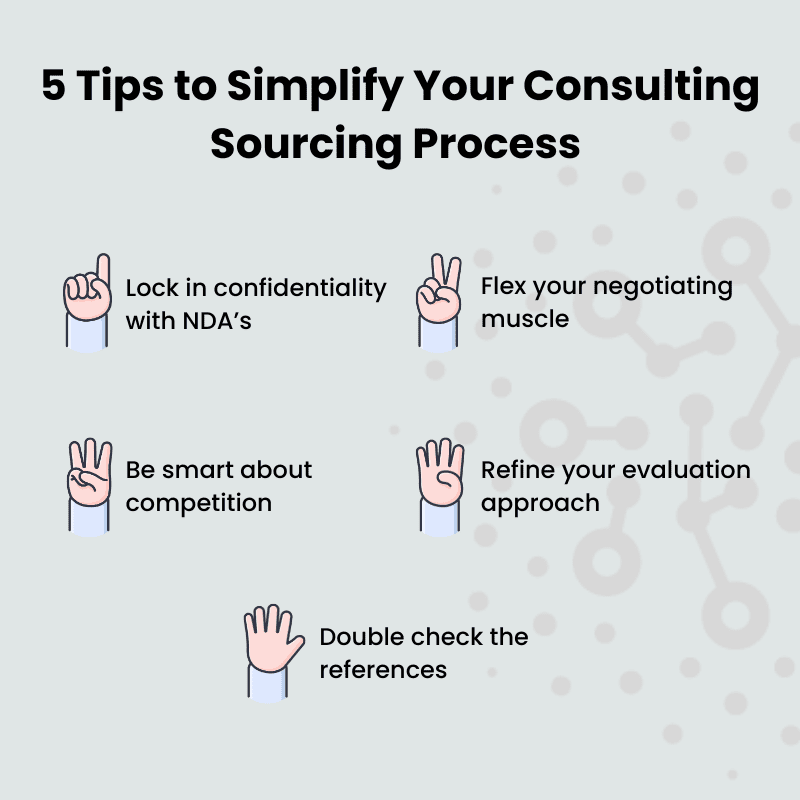Ah, the dreaded task of implementing a consulting sourcing process for consultants. For many of you, hearing this might elicit an eye roll and a muttered “Here we go, ‘une usine à gaz’—a gas plant, a complex labyrinth, a headache in the making.”
But hold that thought! Contrary to popular belief, a sourcing process doesn’t have to resemble an intricate piece of machinery that only a rocket scientist could navigate.
With a pinch of preparation and a spoonful of smart strategy, it’s entirely possible to make your consulting sourcing process not just manageable but smooth as a baby’s bottom.
Most importantly, it can be efficient, steering you away from common pitfalls and straight toward success.
Tip 1: Lock in Confidentiality with NDAs
In the business world, trust is crucial but it shouldn’t replace vigilance. Starting your relationship with consulting providers by signing a Non-Disclosure Agreement (NDA) is more than just a formality; it’s a necessary step to safeguard your sensitive information.
Although NDAs aren’t foolproof, neglecting to use them can put you and your company at unnecessary risk.
You may be surprised to learn that only two-thirds of companies consistently use NDAs when entering into talks with consulting firms.
Even if you believe the consultants you’re speaking to are trustworthy, remember that their business is, essentially, to monetize their knowledge—which can sometimes include information shared across the industry.
Demanding an NDA sets the tone for the entire project. It shows that you’re serious about the engagement and that you prioritize confidentiality. This not only protects you but also sends a clear message to the consulting firm that any breaches of trust will not be taken lightly.
So, before you dive into any strategic conversations, make sure an NDA is signed and sealed. It’s a sound business practice that can save you a lot of headaches down the line.
Tip 2: Flex Your Negotiating Muscle
When it comes to securing consulting services, remember this golden rule: you hold the purse strings, so you have the power.
That doesn’t mean browbeating the other party into submission; it means entering negotiations with a clear understanding that you have something the consultants want—a project and a budget. In this relationship, you’re the client, and that gives you room to define the terms and set the boundaries.
Some professionals fear negotiating too hard with consultants, worrying it might harm their career or future relationships. That’s a misplaced concern. Consultants are there to provide a service and they’re used to the negotiation dance.
They may be experts in their field, but they are, at the end of the day, contractors. It’s essential to remember this dynamic so you can enter negotiations with confidence.
If you’re uncomfortable with the negotiation process or afraid of damaging a relationship, consider leveraging your company’s procurement team. They’re seasoned pros at this, and they won’t have the same reservations you might have.
They can take on the role of the “bad guy,” asking the tough questions and pushing for better terms. With them in your corner, you’ll not only get the best possible deal but also learn a thing or two about the art of negotiation.
So, don’t hesitate to call in reinforcements and flex your bargaining muscle. You have more leverage than you think.

Tip 3: Be Smart About Competition
Competition in sourcing consultants is not just beneficial; we’d go so far as to say it should be your default approach. It ensures that you’re exposed to a range of solutions, fosters a competitive pricing environment, and pushes consultants to deliver their absolute best.
These are benefits that can’t be overlooked. However, life is complex, and sometimes you’ll need to deviate from this principle. The key is knowing when to be flexible.
Strategic Exceptions to the Rule:
Small Projects: It may seem like overkill to solicit multiple bids for a minor assignment. However, remember that competition, even in a small pond, can yield better pricing and performance. But if time and resources are scant, and you already have a reliable consultant in mind, a single-bid strategy may be justifiable.
Highly Specialized Needs: For extremely niche projects, where qualified consultants are scarce, running a competitive process could be futile or counterproductive. If the skillset is so unique that only a handful of consultants fit the bill, then directly engaging with them may be more efficient.
Sequel Projects: Sometimes continuity is key, especially if a project builds directly upon a prior initiative. If the original consultant has delivered excellent results and already has the background needed, you may opt to forego a competitive process for the sake of efficiency.
Urgent Requirements: When time is of the essence, the extended timelines of a competitive process could be a detriment. Here, fast-tracking with a consultant you trust might be the best course of action.
This guide is not advocating for competition as a dogma but as a best practice that can, and should, be flexibly applied. Always aim for a competitive process but recognize that practical constraints may warrant exceptions.
When you do make an exception, do so strategically, fully aware of the trade-offs you’re making. Being rigid can be as detrimental as being too lax. The art of the deal in sourcing consultants lies in balancing the rigors of competition with the wisdom of flexibility.
Tip 4: Refine Your Evaluation Approach
Choosing the right consultant is often the deciding factor in a project’s success. The evaluation isn’t just about selecting the cheapest or fastest option; it’s about finding a consultant who aligns with your project goals, company values, and stakeholder needs.
Here’s how to structure your evaluation process to be both rigorous and adaptable.
Set Criteria and Assign Weights
Your initial RFP should give you a set of criteria to evaluate proposals. Don’t stop at the basics; include nuanced elements like ethics and transparency. Some criteria should be mandatory with corresponding weightage to indicate their importance.
Stakeholder Involvement
A project’s success often hinges on stakeholder buy-in. For large-scale projects, you might need a cross-functional team made up of Finance, Procurement, Strategy, and Business Lines. Smaller projects may require just the Business Lines and a local procurement team.
Scoring Mechanism
Keep the evaluation as objective as possible. Utilize a point-based scoring system or another quantifiable method. Decide how the total score will be calculated and how proposals will be ranked, especially in relation to mandatory criteria and their weights.
The evaluation process is not just about ticking boxes; it’s a strategic exercise that may require some level of compromise. The goal is to select the consultant that provides the best overall value for your organization and stakeholders.
Being thorough in your evaluation not only helps you make the right choice but also equips you to defend your decision to internal and external stakeholders.
Tip 5: Check, Check, and Double-Check References
Checking references is no longer just a formal part of the process—it’s a critical element in making an informed choice about your consulting partner. If you don’t knowe where to start, you introduce our 4R framework: Real, Relevant, Related, and Recent.
Real: Verify the Authenticity
Before diving into the specifics of a project reference, ensure that the individuals vouching for the consulting firm are real, credible people who held the positions they claim to have held. Confirm their involvement in the projects cited as references. Real references are your first line of defense against inflated or false claims by consulting firms.
Relevant: Align with Project Goals
A reference from a marketing project won’t help if you’re focused on supply chain improvements. Ensure that the reference projects are directly aligned with your goals. Relevancy speaks volumes about a consultant’s ability to deliver on your specific needs.
Related: Team-Specific Insights
It’s not just the firm’s reputation that’s important, but the actual team proposed for your project. Make sure the references are about the partner, project manager, or team members who will be directly involved in your project. A brilliant firm is only as good as the team it fields for your initiative.
Recent: Timeliness Matters
It’s great that a consulting firm was successful ten years ago, but what about now? Ensure that the references are from projects conducted in the last five years, if not sooner. This gives you a clearer picture of their current capabilities and performance levels.
Always remember that the success of your consulting project heavily relies on the team leading it. Using our 4R framework enables you to conduct a comprehensive and effective evaluation, increasing the odds that you’ll choose a consulting team that’s not only capable but also the best fit for your unique needs.
Conclusion – Streamline Your Consulting Sourcing Process
So, there you have it. Building an effective consulting sourcing process is less about rigidly adhering to a one-size-fits-all strategy and more about being, well, doubly smart. It’s about flexibility, adaptability, and did we mention—being smart?
Consulting isn’t like other categories where you can slap down a pre-defined process and declare, in your best Mandalorian impression, “This is the way.”
No, sourcing in the realm of consulting is far more nuanced. It demands listening, adapting, and strategizing with a sprinkle of good old-fashioned procuring.
Because in this field, the route to success isn’t a straight highway; it’s a winding road that requires a keen eye and a steady hand. But navigate it well, and you won’t just reach your destination—you’ll arrive in style.
consulting sourcing process consulting sourcing process consulting sourcing process consulting sourcing process
consulting sourcing process consulting sourcing process consulting sourcing process consulting sourcing process
consulting sourcing process consulting sourcing process consulting sourcing process consulting sourcing process
consulting sourcing process consulting sourcing process consulting sourcing process consulting sourcing process

How Consource Can Help?
Consource is built on collaboration, recognizing that the synergy between stakeholders, buyers, and consultants is pivotal in unlocking the full potential of consulting value. Our platform fosters a collective effort, where these essential players join forces to create sourcing strategies that transcend expectations.








0 Comments